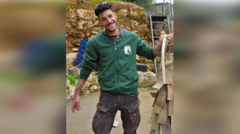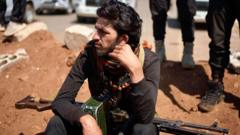A tragic suicide bombing at a church in the Dweila neighborhood of Damascus resulted in the death of 22 individuals and injuries to 63 others. The attack, attributed to an Islamic State-affiliated assailant, has raised alarms about escalating sectarian violence and the persistent threat of terrorism in Syria.
Devastating Suicide Bombing Targets Damascus Church, Claims 22 Lives

Devastating Suicide Bombing Targets Damascus Church, Claims 22 Lives
Attack on the Greek Orthodox Church of the Prophet Elias stirs outrage and concern over the resurgence of violence in Syria.
A devastating suicide bombing occurred at the Greek Orthodox Church of the Prophet Elias in the Dweila district of Damascus on Sunday evening, leading to the deaths of at least 22 people and injuring 63 others, according to the Syrian health ministry. Eyewitness accounts report that the attacker entered the church during a service, opened fire, and then detonated an explosive vest. The interior ministry indicated that the assailant had ties to the jihadist group Islamic State (IS), although no official claim of responsibility has been made by the group.
Images from the scene reveal a scene of chaos, with a damaged altar, shattered pews, and bloodstains marring the church's sanctity. Witness Lawrence Maamari recounted the horrifying moment, stating, "someone entered [the church] from outside carrying a weapon" and started shooting before the explosion ensued. Another nearby shopkeeper, Ziad, described the ensuing chaos, with glass flying and remnants of wooden benches scattered tragically across the entrance.
This incident marks the first suicide attack in Damascus since Islamist-led rebels ousted Bashar al-Assad in December, a moment that ended years of severe civil conflict. Following the assault, the Greek Orthodox Patriarchate of Antioch condemned the attack, framing it as a grievous offense against the faith and urging Syria's authorities to safeguard religious sites and its citizens.
Interior Minister Anas Khattab announced that specialized teams have begun investigating what he labeled as a "reprehensible crime." Khattab pledged that such acts of terror would not derail Syria’s journey toward civil peace. Additionally, the UN special envoy for Syria, Geir Pedersen, denounced the violence and called for unity against extremism.
Interim President Ahmed al-Sharaa, whose faction has a controversial history concerning religious minorities, has faced scrutiny in light of rising sectarian tensions and violent episodes, particularly targeting Christians. The IS has a notorious history of attacks against religious minorities in Syria, with previous incidents leading to significant casualties.
Despite its territorial defeat in 2019, IS's lingering presence is still felt in Syria, with estimates suggesting that between 1,500 and 3,000 fighters operate across the region. Reports even denote that these fighters may exploit the ongoing instabilities to escalate attacks, posing an enduring threat to Syrians and their safety.






















